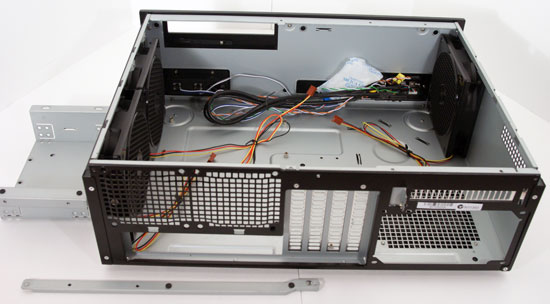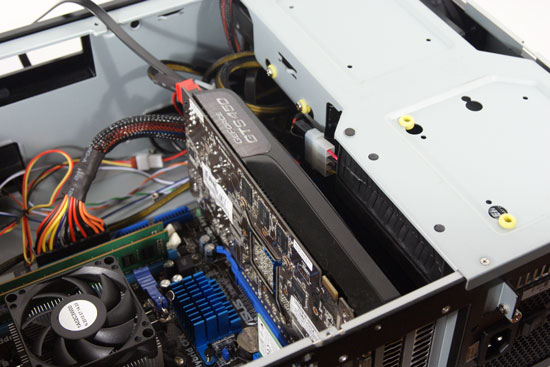SilverStone GD04 HTPC Case: Cool, Not Quiet
by Dustin Sklavos on December 25, 2010 12:00 AM EST- Posted in
- Cases/Cooling/PSUs
- HTPC
- SilverStone
- GD04
Assembling an HPTC in the GD04
When building in most cases, the assembly is fairly self-explanatory. The SilverStone GD04? Not so much. Installing my hardware in the GD04 actually resulted in my consulting the instructions that come with the case fairly frequently, and there's a reason why: SilverStone specifies a very specific order for installing components to keep cable routing fairly clean and easy.

The first thing you'll need to do is remove the trays and the crossbar, and for sanity's sake the motherboard should probably go in before the power supply does. SilverStone actually includes rubber standoffs that adhere to the bottom of the power supply, as there's a centimeter or so worth of empty space between where the unit mounts and the bottom of the case. You'll want to connect whatever cables you can and install your expansion cards, because the next step involves putting the crossbar back in.
It's at this point that you should also note the 120mm fans all come with three-pin connectors and are intended to be plugged into and controlled by the motherboard. That would be fine, but most MicroATX boards don't come with that many fan control headers (to say nothing of MiniITX), not to mention how mediocre most motherboard implementations of fan control are. SilverStone includes an adapter that allows you to plug all three headers into a single molex connector, but that also means the fans are running at full bore all the time, and you'll see why that's a problem later on. Mercifully, the fans have built-in internal grates that keep bunched up cables from getting caught in the fan blades.
After you've replaced the crossbar, you'll need to mount the hard drive or drives into the mounting tray. The tray actually supports up to three drives total: two 3.25" and a 2.5". It's probably easiest to just install one big storage drive - this is a media center case after all. The 2.5" bay does make using an SSD as an OS drive easy, however. Installing the optical drive is also pretty simple, and there's some give on it so you can line it up properly with the opening in the front. I've read that one or two users on NewEgg had to shave off part of the tray opening for their builds, but the combination Blu-ray/HD-DVD drive I have fit perfectly and without issue.

If you follow the instructions that come with the GD04, assembly actually goes fairly smoothly. The main problem is really just what a nuisance all the tiny screws can be. I understand going entirely toolless may be a convenience not available for a case this size designed for this task, but I can't help but feel like this whole ordeal could've been easier.
















68 Comments
View All Comments
micksh - Saturday, December 25, 2010 - link
I use Antec P182 case for my desktop. It is a great case for quiet PC, their sound dampering panels do a good job. Something that can't be found in any HTPC case. P150 has similar design, except it doesn't have a front door and it's a bit smaller.But I could not tolerate Antec fans even at minimum settings. P150 has the same Antec 3-speed fans, AFAIK. Just check silentpcreview.com forum, everybody is replacing them.
PC Power & Cooling may make very good PSUs, I don't know. It is just whether PSU makes 12 or 18 dBA of noise it becomes very important for quiet PC. These brands that I listed are known to be very quiet. They would produce less than 15 dBA of noise for that PC. Not ridiculous 36 dBA that was measured in the article.
Nexus Value 430W PSU would be ideal for that kind of PC if CPU was not too power hungry.
I don't think 2.5" HDDs are less reliable. I had one in laptop that was 5 years old and it was still alive when I replaced it.
I use 2.5" HDDs in Scyche enclosures in 2 HTPCs just for silence. Because 3.5" drives can't normally fit in HTPC being put inside silencing enclosure.
SSD is not a necessity if you have 4GB of RAM. 7200 rpm laptop drive is good enough for a system drive. It is just that they are a bit louder than 5400 rpm drives and 5400 rpm drives are a bit slow for a boot drive.
Although, most people would be OK with 7200 rpm laptop HDD noise, I think.
AMD CPU idle power usage can't compete even with Intel Core 2 line. They require more cooling and more speedy fans = more noise. Especially quad core model that article author chose.
MeanBruce - Saturday, December 25, 2010 - link
Micksh, you have some great information and I wish AnandTech would present more articles for us silent enthusiasts. At first I did what you did, I shopped for quiet, quality PSUs Nexus, Zalman, etc. But this last time around I went a step further, I bought the most efficient PSU I could find(at the time) a Corsair HX-850, and I didn't consider any db noise fan specs because I planned on replacing the fan after the first few days of use. It's not the most economical way to put together a silent pc, breaking the amazing 7-year Corsair warranty, by opening the PSU, and another $25 for a Noctua fan, but you end up with an amazingly quiet pc. Not everyone wants to get inside a power supply, but the extra effort pays off!micksh - Saturday, December 25, 2010 - link
Yes, replacing PSU fan is also a way to get quieter PC. If you already have good PSU and are ready to void warranty. Even $10 Scythe Slipstream would probably do the job, maybe with some $3 resistor. $25 Noctua is surely a safer bet.But if new fan is not adequate it may eventually break PSU.
If you want to spend more you can't go wrong with Seasonic X650 Gold PSU. Its fan is not spinning at low loads, it's essentially passive when you watch movies (if your system consumes 150W or less during that, which should be the case).
The fan will start only during gaming when silence is not that important and it still will be quiet.
I think the most difficult part in building quiet PC is silencing hard drive (if you need it).
I have a server in garage that I can stream media from but having some local storage seems comfortable for me.
These days boot SSD are relatively cheap so the need in that is diminished for some.
There are components that generally produce much more noise but you can get very quiet parts for a bit more money.
Power supplies, video cards (up to GTX460 or HD6850 level), CPU coolers, case fans, all can be gotten very quiet if you do some research.
Then at some point HDD becomes the noisiest part. If you reach the stage when soft-mounted 2.5" 5400 rpm HDD is the loudest part of your build and you can silence it (or ditch it) - then you get a quiet computer.
PS. I missed phrase in article that says the distance was 1 foot when measuring noise. I think noise would be 30 dB or more at one meter, still way too loud.
micksh - Saturday, December 25, 2010 - link
Another point of the article - loud blu-ray drive. That will be too difficult to silence even in well shielded case with soft mounts.Try software solutions, something like Nero DriveSpeed. There are others. These would limit disk spinning speed and reduce the noise. They work but the effect may or may not be sufficient depending on you drive and noise requirements.
I play movies from HDD only right now so this is not relevant to me.
Freeco - Saturday, December 25, 2010 - link
I have this case since September and am very happy with it.I did replace the 3 stock fans with 2 Nexus 120mm fans and a Zalman FanMate 2 controller. I didn't even try those stock fans. I replaced them right away because of my good experience with them in my desktop.
Combine that with a Scythe Big Shuriken CPU cooler and a Nexus Value PSU and the result is a dead silent HTPC. I can only hear it if I put my ear right next to it.
Building a silent HTPC is all about choosing the right components...
mingus - Saturday, December 25, 2010 - link
With the Big Shuriken, is there enough room for sound and video cards?I used and Enermax ECO80+ 400w PSU, not sure why, usually use Seasonic. seems quiet, hard to tell.
CPU cooler was some sort of Nexus thing.
Freeco - Sunday, December 26, 2010 - link
off coarse. The Big Shuriken might be big, but not huge ;-)It doesn't overhang the PCIe slots.
See picture on my site (in Dutch, but pics & specs don't have a language ;-)):
http://www.weytens.net/pc_hw_htpc.html
maxfisher05 - Saturday, December 25, 2010 - link
I have a similar build as Freeco. I bought this case in July, paired it with 2 nexus 120mm fans (the 3 stock fans are loud, but 3 fans is overkill anyway). I have a scythe big shuriken cooler on a i-530 and a 5770 video card, both of which are low power and fairly quiet components.Bottom line, I never hear any noise out of this case when doing normal HTPC tasks and I love my build. I'm guessing if I ran prime and maxed out the fans it would make noise...
Oscarcharliezulu - Saturday, December 25, 2010 - link
Thx for the review, but I'd have to agree that the choice of components needed more research if you wanted a quiet PC, and even then some advertised so called quiet components aren't. A htpc can be real trial and error and I think the readers are looking for reviews that provide more than pure observation, or at least I am. Thanks to the posters who write in with what works for them. Personally I have found the low power Athlons and boards with built in gpu's excellent for htpc work. Big fans set to low speed also critical as are green drives. SSD for boot disk will be my next must have upgrade firstly for quicker boots secondly for low noise. I plan to set my recordings or download to a spinning disk then copy once complete to the ssd to run fast and quiet ( I don't have a NAS or server).MeanBruce - Saturday, December 25, 2010 - link
Oscar is right, it really depends on your personal definition of quiet. Most so called silent fans produce around 18 to 20db, which is fine for most people, htpc or if your pc is on the floor. But if like me you prefer your desktop to be on your desktop then the really sweet noise levels are below 10db. The Cooler Master 200mm fans are way too loud out of the box, yet attenuate down to a wonderful 8db with a Noctua blue inline resistor, and still move a great deal of air. Noctua also makes the uln series of fans which are rated at 6db. Also replacing the stock psu fan with a 10db 140mm Noctua and using SSDs for all internal storage and you will be in silent heaven.